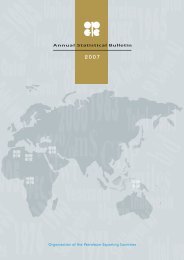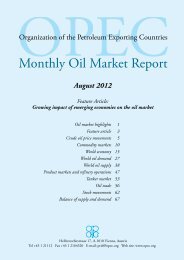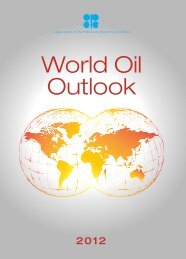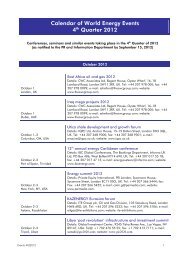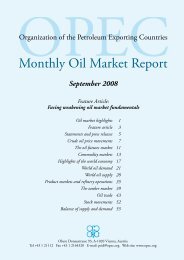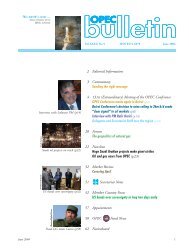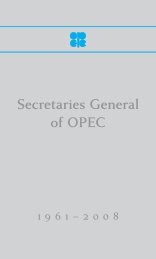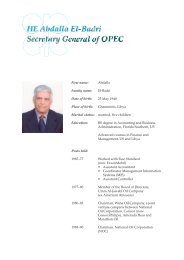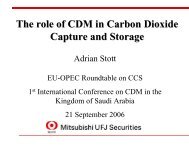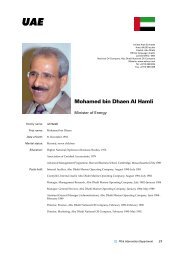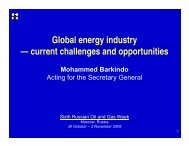2005 - OPEC
2005 - OPEC
2005 - OPEC
You also want an ePaper? Increase the reach of your titles
YUMPU automatically turns print PDFs into web optimized ePapers that Google loves.
A second study, on Rules and Differential Treatment of the WTO and its Implications for <strong>OPEC</strong><br />
Countries: An Analytical Review, provided a comprehensive review of the ways specific demands<br />
from developing countries were addressed in the multilateral trading system. This also analysed<br />
the provisions dealing with these types of countries and linked this analysis to the position of<br />
energy exporting countries. The report on The run-up to the WTO Sixth Ministerial Conference<br />
was prepared for the coordination meeting for MCs held prior to this event, while the study on<br />
Implications, Including for Development, of WTO Rules on Subsidies and Countervailing Measures<br />
and Anti-Dumping, for Oil-Exporting Countries, commissioned to an outside consultant, primarily<br />
addressed those issues of relevance to MCs’ pricing policies in the energy sector.<br />
As in previous years, the Secretariat monitored and researched developments in the UNFCCC<br />
negotiations and actively participated in the Subsidiary Bodies and COP meetings. A report<br />
entitled Run-up to COP-11: Implementation Issues and Implications for <strong>OPEC</strong> was prepared for<br />
the coordination meeting for MCs held prior to the 11th Conference of the Parties (COP-11)<br />
in Montreal, Canada, while input was also prepared on the climate change issue in advance<br />
of the <strong>2005</strong> G-8 Summit. Furthermore, the Secretariat presented <strong>OPEC</strong>’s views on environ-<br />
mental issues at all major events during the year and continued distribution of the Quarterly<br />
Environmental Newsletter.<br />
Work in Data Services, such as statistical database updates, computer system maintenance,<br />
user supports and services were ongoing to accommodate the needs of the RD and MCs.<br />
Further emphasis was also placed on improving the quality of service, for example through<br />
strengthening direct data communications with MCs, the installation of fault-tolerant systems,<br />
proactive maintenance of the hardware and software systems and the expansion of an online<br />
catalogue of library periodicals.<br />
There was also enhancement in the quality and timeliness of data received from MCs. The<br />
expanded coverage of statistical data areas was utilised to enhance reports and analyses in<br />
the Secretariat. The positive outcome of these on-going efforts to enhance compilation of<br />
data from MCs was reflected in the improved completeness and timeliness of responses to<br />
the Annual Questionnaire. The Secretariat also continued its active stance in the discussions<br />
on harmonisation of data definitions with international organisations, as well as with inter-<br />
national experts.<br />
The quality of the data is assured through careful analysis, comparison and validation that<br />
utilises new software. Besides direct input data modules to the in-house models and cus-<br />
tomised data services, delivery of key and up-to-date information to end-users is prepared<br />
5



